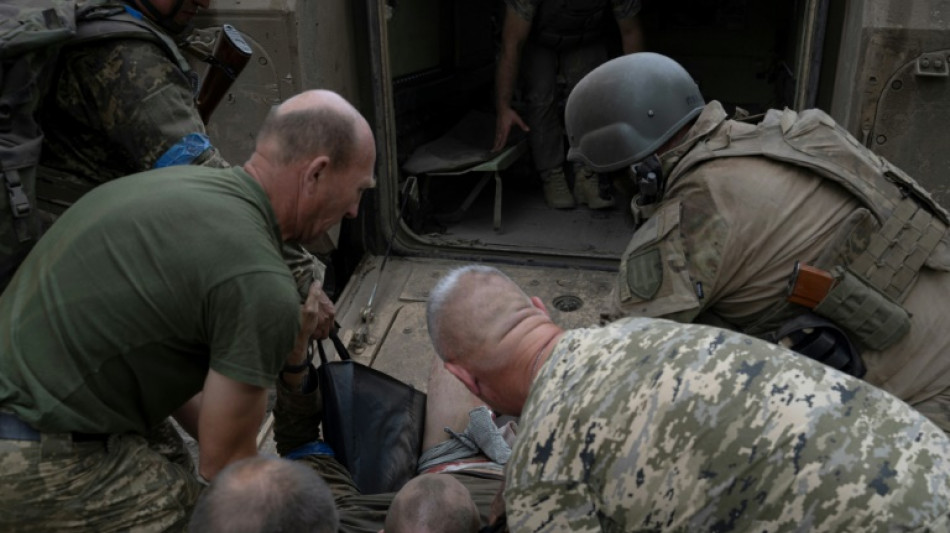
-
 Emery defends failure to shake hands with Arteta after Villa loss to Arsenal
Emery defends failure to shake hands with Arteta after Villa loss to Arsenal
-
China says to impose extra 55% tariffs on some beef imports

-
 Japanese women MPs want more seats, the porcelain kind
Japanese women MPs want more seats, the porcelain kind
-
Guinea junta chief Doumbouya elected president: election commission

-
 Pistons pound Lakers as James marks 41st birthday with loss
Pistons pound Lakers as James marks 41st birthday with loss
-
Taiwan coastguard says Chinese ships 'withdrawing' after drills

-
 France's homeless wrap up to survive at freezing year's end
France's homeless wrap up to survive at freezing year's end
-
Leftist Mamdani to take over as New York mayor under Trump shadow

-
 French duo stripped of Sydney-Hobart race overall win
French duo stripped of Sydney-Hobart race overall win
-
Thailand releases 18 Cambodian soldiers held since July

-
 Tiny tech, big AI power: what are 2-nanometre chips?
Tiny tech, big AI power: what are 2-nanometre chips?
-
Libyans savour shared heritage at reopened national museum

-
 Asia markets mixed in final day of 2025 trading
Asia markets mixed in final day of 2025 trading
-
Global 'fragmentation' fuelling world's crises: UN refugee chief

-
 Difficult dance: Cambodian tradition under threat
Difficult dance: Cambodian tradition under threat
-
Regional temperature records broken across the world in 2025

-
 'Sincaraz' set to dominate as 2026 tennis season kicks off
'Sincaraz' set to dominate as 2026 tennis season kicks off
-
Bulgaria readies to adopt the euro, nearly 20 years after joining EU

-
 Trump v 'Obamacare': US health costs set to soar for millions in 2026
Trump v 'Obamacare': US health costs set to soar for millions in 2026
-
Isiah Whitlock Jr., 'The Wire' actor, dies at 71

-
 SoftBank lifts OpenAI stake to 11% with $41bln investment
SoftBank lifts OpenAI stake to 11% with $41bln investment
-
Bangladesh mourns ex-PM Khaleda Zia with state funeral

-
 TSMC says started mass production of 'most advanced' 2nm chips
TSMC says started mass production of 'most advanced' 2nm chips
-
Australian cricket great Damien Martyn 'in induced coma'

-
 Guinea junta chief Doumboya elected president: election commission
Guinea junta chief Doumboya elected president: election commission
-
Apex Provides Recap of 2025 Regional Exploration Drilling and Priority Follow Up Targets at the Cap Critical Minerals Project

-
 Guardian Metal Resources PLC Announces Total Voting Rights
Guardian Metal Resources PLC Announces Total Voting Rights
-
Caballero defends Maresca after Palmer substitution sparks jeers

-
 Depleted Man Utd 'lack quality', says Amorim
Depleted Man Utd 'lack quality', says Amorim
-
'We know what we want': Arteta eyes title after Arsenal thrash Villa

-
 Arsenal crush Villa to make statement in title race
Arsenal crush Villa to make statement in title race
-
Senegal top AFCON group ahead of DR Congo as Tanzania make history

-
 Maresca in the firing line as Chelsea stumble against Bournemouth
Maresca in the firing line as Chelsea stumble against Bournemouth
-
Senegal top AFCON group, DR Congo to face Algeria in last 16

-
 Norway's Magnus Carlsen wins 20th world chess title
Norway's Magnus Carlsen wins 20th world chess title
-
Patriots star Diggs facing assault charges: reports

-
 Journalist Tatiana Schlossberg, granddaughter of JFK, dies at 35
Journalist Tatiana Schlossberg, granddaughter of JFK, dies at 35
-
Rio receives Guinness record for biggest New Year's bash

-
 Jokic out for four weeks after knee injury: Nuggets
Jokic out for four weeks after knee injury: Nuggets
-
World bids farewell to 2025, a year of Trump, truces and turmoil

-
 Far-right leader Le Pen to attend Brigitte Bardot's funeral
Far-right leader Le Pen to attend Brigitte Bardot's funeral
-
Drones dive into aviation's deepest enigma as MH370 hunt restarts

-
 German dog owners sit out New Year's Eve chaos in airport hotels
German dog owners sit out New Year's Eve chaos in airport hotels
-
Tanzania hold Tunisia to end 45-year wait for AFCON knockout spot

-
 10 countries warn of 'catastrophic' Gaza situation
10 countries warn of 'catastrophic' Gaza situation
-
Performers cancel concerts at Kennedy center after Trump renaming

-
 Burst tyre and speed contributed to Joshua crash say investigators
Burst tyre and speed contributed to Joshua crash say investigators
-
Students join Iran demonstrations after shopkeepers protest

-
 Johnson still a Spurs player despite Palace interest, says Frank
Johnson still a Spurs player despite Palace interest, says Frank
-
UAE to pull forces out of Yemen as 24-hour deadline set


Blood and fears: The military medics of Bakhmut
The armoured evacuation vehicle screeched to a halt to the sound of artillery fire and unloaded a group of reconnaissance soldiers whose mission went bad in Bakhmut.
Some lost their balance stumbling over the doorstep of a shelled-out building posing as the closest field hospital to the flaming front.
Their worn uniforms were torn open to expose wounds or help the dirt-covered men breathe. A few leaned against their rifles or slid to the ground with their backs against the wall.
None said how many friends they had just lost on the killing fields of Ukraine's brutal battle in Bakhmut.
Their unit was probing the Russian defences when it was detected and exposed. Enemy tanks opened fire at point-blank range.
The concussed soldiers waved their arms and swore while reliving the ensuing chaos as they waited for their medical assessment tests.
A team of medics -- some still in slippers -- silently pulled out shrapnel from the wounded as more soldiers were stretchered in.
The intensity of the medics' shift is a window into the mounting emotional and physical toll for Ukraine's medical staff who have played a vital but behind-the-scenes role for 17 months of Russia's full-scale invasion.
"I have reasons to exact revenge on the Russians," surgeon Kirilo Orlov said after saving one of the troops.
"I mean real revenge. I have lost too many acquaintances and friends," the 40-year-old said.
- Jitters and shock -
Orlov's field hospital stands in a ghost town whose ground is a tangle of debris and whose air shakes from incessant blasts.
The military medics take turns smoking at an open doorway facing away from the Russians and almost never step a foot outdoors.
Some pull on flak jackets and dash to an armoured vehicle to rescue more soldiers when the orders come.
Automatic rifles lean against corners and walkie talkies relay the sounds of war.
Sergiy Podolyan sat alone in the hallway with sweaty palms.
"This is something new," the fresh-faced 27-year-old said on his first day at the front.
"We had some military training at a shooting range so we got a bit used to the blasts," he whispered under his baseball cap.
"But not like this."
- 'Fighting smarter' -
The medics have less work now that Ukraine's forces have abandoned their defence of Bakhmut and are trying to ensnare it in a pincer movement from the west.
"We have one-third the number of cases we did in February or March," doctor Dmytro Urakov said.
"We are fighting smarter now," the 42-year-old added before slinging a rifle over his shoulder and walking off to get some rest.
But the precision attacks along Bakhmut's flanks still run into stiff Russian defences and minefields.
Battles over strategic heights -- often little more than a bumpy hill -- can last weeks.
The wounded soldiers were too fresh off the battlefield to think of anything else.
"They want to go back out there," nurse Galina Slobodyan said with a compassionate smile after bandaging a soldier's arm.
The soldier had just gruffly rejected Slobodyan's advice to get more treatment at a real hospital away from the front.
"I can't tell them no."
- 'To kill a medic' -
Slobodyan herself was drawn to the war.
The 23-year-old was working as a hairdresser in Poland when Russia invaded 17 months ago.
She rushed back to Ukraine while millions of others were flooding out.
"You sit abroad, make money, but what's the point?" she asked, while shyly scratching a tattoo on her neck.
"I wanted to be useful, so that I could be of at least some help."
Most of the wounded had been cared for and the medics were going back to scrolling their mobile phones to unwind.
Slobodyan was giggling with Podolyan in a corner to try and relieve the rookie's stress.
But surgeon Orlov sat in stormy silence next to the operating table and stared off into space.
A new medical team would soon be going out to what Ukrainians call "point zero" -- the very epicentre of fighting -- to rescue more wounded men.
Orlov said each one of his medics was a target for the Russians.
"It's not like World War II, when you have a red cross and they don't shoot at you," he said.
"On the contrary, they will shoot. For them, this is a primary target, to kill a medic."
L.Durand--AMWN

